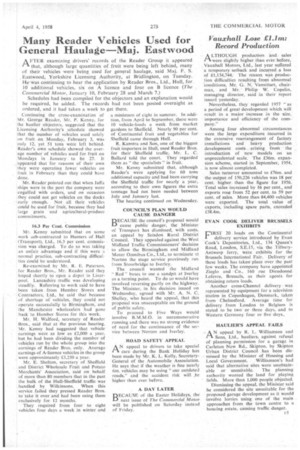Many Reader Vehicles Used for General Haulage—Maj. Eastwood
Page 39

If you've noticed an error in this article please click here to report it so we can fix it.
AFTER examining drivers' records of the Reader Group it appeared that, although large quantities of fruit were being left behind, many of their vehicles were being used for general haulage, said Maj. F. S. Eastwood, Yorkshire Licensing Authority, at Bridlington, on Tuesday. He was continuing to hear the application by Reader Bros., Ltd., Hull, for 10 additional vehicles, six on A licence and four on B licence (The Commercial Motor, January 10, February 28 and March 7.)
Schedules had been compiled for the objectors and an explanation would be required, he added. The records had not been posted overnight as ordered, and it had taken a week to get them.
Continuing the cross-examination of Mr. George Reader, Mr. P. Kenny, for the haulier objectors, suggested that the Licensing Authority's schedule showed that the number of vehicles used solely on fruit on Monday, February 3, was only 12, yet 51 tons were left behind. Reader's own schedule showed the average number of vehicles used for fruit on Mondays in January to be 27. It appeared that for reasons of their own they were operating fewer vehicles on fruit in February than they conld have done.
Mr. Reader pointed out that when Jaffa ships were in the port the company were engulfed with orders, and on occasion they could not get vehicles on the docks early enough. Not all their vehicles could be used for fruit, because they had large grain and agricultural-produce commitments.
16.3 Per Cent. Commission
Mr. Kenny submitted that on some work sub-contracted to Hunters of Hull (Transport), Ltd., 16.3 per cent. commission was charged. To do so was taking an unfair advantage and if this were a normal practice, sub-contracting difficulties could be understood.
Re-examined by Mr. R. E. Paterson. for Reader Bros.. Mr. Reader said they hoped shortly to open a depot in Liverpool. Lancashire traffic was developing steadily. Referring to work said to have been taken from Humber Stores and Contractors, Ltd., he said that because of shortage of vehicles, they could not operate successfully to Birmingham, and the Manchester wholesalers had gone back to Humber Stores for this work.
Mr. H. Watford, secretary of Reader Bros., said that at the previous hearing, Mr. Kenny had suggested that vehicle earnings were as low as £2,000 a year, but he had been dividing the number of vehicles run by the whole group into the earnings of Reader Bros. only. Average earnings of A-licence vehicles in the group were approximately £3.250 a year.
Mr. E. Shelton, secretary of Sheffield and District Wholesale Fruit and Potato Merchants' Association, said on behalf of more than 80 members that in the past the bulk of the Hull-Sheffield traffic was handled by Wilkinsons. When this service failed they pressed Reader Bros. to take it over and had been using them exclusively for 12 months.
They required from four to eight vehicles four days a week in winter and
a minimum of eight in summer. In addition, from April to September, there were 10 vehicle-loads a week from market gardens to Sheffield. Nearly 90 per cent. of Continental fruit and vegetables for Sheffield came through Hull.
R. Kanstra and Son, one of the biggest fruit importers in Hull, used Reader Bros. for their Sheffield traffic, Mr. L. C. Ballard told the court. They regarded them as " the specialists " in fruit.
Mr. Kenny submitted that, although Reader's were applying for 60 tons additional capacity and had been carrying the Sheffield traffic for nearly a year, according to their own figures the extra tonnage had not been needed between July and January last.
The hearing continued on Wednesday.
COUNCIL'S PLAN WOULD CAUSE DANGER
BECAUSE the council's proposal would cause public danger, the Minister of Transport has dismissed, with costs, an appeal by Seisdon Rural District Council. They appealed against the West Midland Traffic Commissioners' decision to allow the Birmingham and Midland Motor Omnibus Co., Ltd., to terminate at Norton the stage service previously run from Stourbridge to 1verley.
The council wanted the Midland
Red buses to use a sandpit at Iverley as a turning point. To do so would have involved reversing partly on the highway. The Minister, in his decision issued on Wednesday, agreed with Mr. A. N. C. Shelley, who heard the appeal, that this proposal was unacceptable on the ground of public safety.
To proceed to Five Ways would involve B.M.M.O. in unremunera five running and there was no strong evidence of need for the continuance Of the service between Norton and Kerley.
ROAD SAFETY APPEAL
AN appeal to drivers to take special care during the Bank Holiday has been made by Mr. K. L. Kelly, SecretaryGeneral of the Automobile Association. He says that if the weather is fine nearly 6m, vehicles may be using " our outdated roads," and the accident risk will be higher than ever before.
A DAY LATER
DECAUSE of the Easter Holidays, the next issue of The Commercial Motor -will be published on Saturday instead of Friday.












































































































